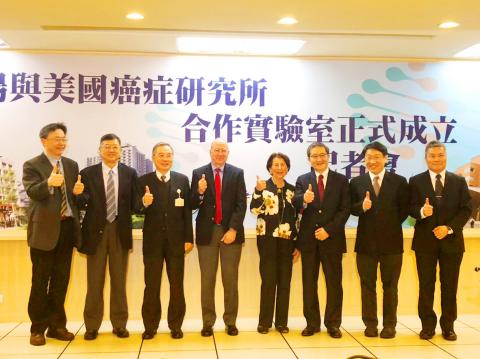National Yang-Ming University and Taipei Veterans General Hospital yesterday announced that the National Cancer Institute, the US government’s lead agency for cancer research, has established a laboratory in Taiwan and is to begin a five-year collaborative research project focusing on lung cancer.
National Yang-Ming University vice president and Cancer Progression Research Center director Yang Muh-hwa (楊慕華) said lung cancer ranked No. 1 in the top 10 causes of cancer in Taiwan in 2016, claiming approximately 9,000 lives each year, and that it is also among the deadliest cancers in the US, making it a shared enemy of both nations.
While lung adenocarcinoma is the most common type of lung cancer in Taiwan and the US, there are differences in genetic mutations among patients in the two nations, he said, adding that a larger proportion of Taiwanese patients were found to have an epidermal growth factor receptor gene mutation.

Photo: CNA
Identification of the genetic mutations driving lung cancer is important for doctors to decide the cancer treatment strategy and targeted therapy, Yang said.
Nina Solarz, the wife of late US representative Stephen Solarz, who proposed bills in support of Taiwan and visited Taiwan several times, has established a memorial fund at the Foundation for the US National Institutes of Health in her husband’s memory to support cancer research, the university and hospital said.
The fund has supported the establishment of the new research laboratory in Taiwan, they said.
The five-year collaborative research project is to focus on the ethnic differences of the lung cancer genome and epigenetics in lung cancer diagnosis and therapy, as well as research on immunotherapy and stem cells.

An alleged US government plan to encourage Taiwan Semiconductor Manufacturing Co (TSMC) to form a joint venture with Intel to boost US chipmaking would place the Taiwanese foundry giant in a more disadvantageous position than proposed tariffs on imported chips, a semiconductor expert said yesterday. If TSMC forms a joint venture with its US rival, it faces the risk of technology outflow, said Liu Pei-chen (劉佩真), a researcher at the Taiwan Industry Economics Database of the Taiwan Institute of Economic Research. A report by international financial services firm Baird said that Asia semiconductor supply chain talks suggest that the US government would

WANG RELEASED: A police investigation showed that an organized crime group allegedly taught their clients how to pretend to be sick during medical exams Actor Darren Wang (王大陸) and 11 others were released on bail yesterday, after being questioned for allegedly dodging compulsory military service or forging documents to help others avoid serving. Wang, 33, was catapulted into stardom for his role in the coming-of-age film Our Times (我的少女時代). Lately, he has been focusing on developing his entertainment career in China. The New Taipei District Prosecutors’ Office last month began investigating an organized crime group that is allegedly helping men dodge compulsory military service using falsified documents. Police in New Taipei City Yonghe Precinct at the end of last month arrested the main suspect,

Starlux Airlines on Tuesday announced it is to launch new direct flights from Taiwan Taoyuan International Airport to Ontario, California, on June 2. The carrier said it plans to deploy the new-generation Airbus A350 on the Taipei-Ontario route. The Airbus A350 features a total of 306 seats, including four in first class, 26 in business class, 36 in premium economy and 240 in economy. According to Starlux’s initial schedule, four flights would run between Taoyuan and Ontario per week: Monday, Wednesday, Friday and Saturday. Flights are to depart from Taoyuan at 8:05pm and arrive in California at 5:05pm (local time), while return flights

LITTORAL REGIMENTS: The US Marine Corps is transitioning to an ‘island hopping’ strategy to counterattack Beijing’s area denial strategy The US Marine Corps (USMC) has introduced new anti-drone systems to bolster air defense in the Pacific island chain amid growing Chinese military influence in the region, The Telegraph reported on Sunday. The new Marine Air Defense Integrated System (MADIS) Mk 1 is being developed to counter “the growing menace of unmanned aerial systems,” it cited the Marine Corps as saying. China has constructed a powerful defense mechanism in the Pacific Ocean west of the first island chain by deploying weapons such as rockets, submarines and anti-ship missiles — which is part of its anti-access/area denial (A2/AD) strategy against adversaries — the